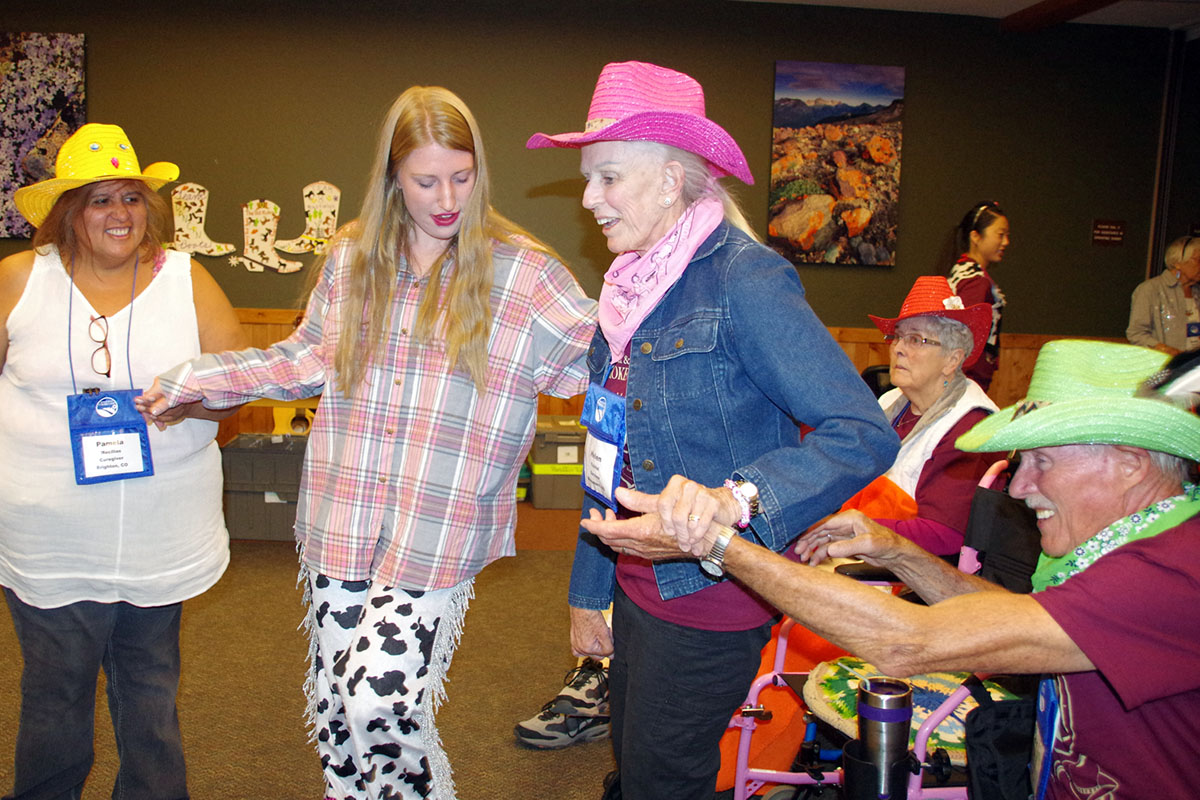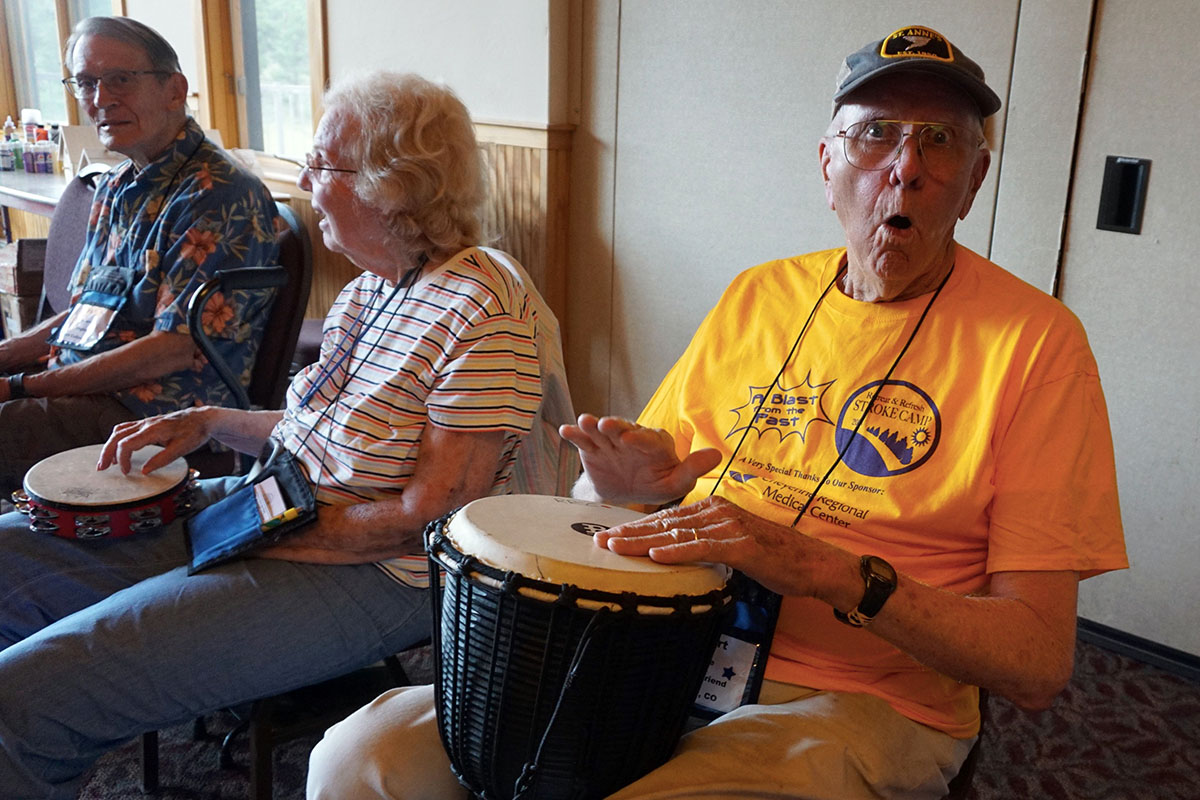About Stroke Camp
Our Mission
The mission of Retreat & Refresh Stroke Camp is to improve the quality of life for stroke survivors, caregivers, and their families. This is accomplished through weekend retreats, as well as community stroke education and awareness events for the public.
History
In September of 2001, Marylee Nunley's husband John suffered a stroke at the age of 55, an event that changed their lives forever. Following the stroke, John couldn't speak, walk, or understand much of what was going on around him. As most stroke survivors know, the road to recovery can be quite challenging. The Nunleys were no exception.
About two years after the stroke, Marylee read an article about a camp for stroke survivors who had aphasia. After reading that story, she knew that she was meant to pursue the dream of having a similar camp in her community. Her family has had a lifelong love of camping, so planning and executing the camp wasn't particularly frightening. With the help and support of countless individuals, they were able to realize their dream. The first Stroke Camp was held in September of 2004.
As a result of the success of that first camp, the dream to hold a single camp in Illinois has now grown to include non-profit status and a national network of stroke camps for stroke survivors, caregivers, and family members.
Questions & Answers
What do we do at Stroke Camp?
Crafts, games, educational sessions, resources, pampering, friendship, good food, hiking/walking, discussion groups, informal chat with experts, Wii, entertainment, relaxation, and more! Outdoor activities will vary by retreat center/facility and time of year, but may include fishing, boating, rock climbing, and swimming. The entire weekend is carefully planned for stroke survivors, caregivers, and family members. Activities are modified so everyone can participate. Volunteers will support and assist you throughout the weekend.
Is camp right for my level of disability?
The three day weekend retreats are designed specifically for stroke survivors, caregivers, and their family members. Adaptations are made to the best of our ability so that everyone can participate. Survivors are encouraged to attend with a caregiver. At camp, caregivers are asked to assist their survivor with daily routines as is necessary. Our volunteers are available to provide a helping hand, but will not provide skilled nursing care. As long as the caregiver is able to assist the survivor with activities of daily living (bathing, dressing, grooming, medication administration, etc), you are welcome to register for camp. The number of handicapped rooms varies by facility and are assigned based on greatest need. Please be sure to provide adequate information on the registration form about the level of disability to aid in our room assignments.
Can I, a survivor, attend without a caregiver?
Camp is designed for both the survivor and caregiver. However, it is not uncommon for a more independent survivor to attend without their caregiver. Survivors attending alone need to be able to independently perform all activities of daily living (bathing, dressing, grooming, medication administration, etc).
Can I bring my pet with me to camp?
Stroke Camp has a no pets policy. Service animals are welcomed, but we must know in advance, and you need to provide the paperwork documenting that your pet is a service animal. Therapy/companion dogs/cats are not permitted. We appreciate your understanding in regards to this matter.
How much does camp cost?
The three day weekend retreat is $150 per person for most of the retreats. A few camps cost more, and some are less if the sponsor chooses to supplement the registration fee. The registration form for each retreat will have the registration fee listed on it. We thank our sponsors for the financial support that makes Stroke Camp possible!
I don't think I'm able to pay registration fee. Is there any assistance available?
Yes, we ask that individuals needing assistance with the registration fees call our office at 309-688-5450 to discuss your needs.
I'm fortunate enough that the $150 per person does not create a hardship for me and would like to help send someone else to camp. Can I donate?
Yes! Donations designated for our "scholarship" fund can be made through the Donate button on our website or by mailing a check. Thanks to donations received throughout the year, we have never turned anyone away from camp due to inability to pay the full camper fee.
Do we sleep in tents?
No! With few exceptions, the majority of camps are held at conference and retreat centers and campers stay in hotel style rooms with private or nearby bathrooms. A few of the camps are held at facilities with more dorm or bunk type lodging. More information will be provided to you about the lodging for your specific camp when you register. Volunteers may be asked to stay in bunk style lodging when necessary.
How can I find a camp near me?
Go to the Camp Dates/Registration page of our website to see a listing of dates and locations. You can register online, or print a form to mail to us. Camp listings are frequently updated, so check back periodically!
There's not a camp in my area. What can I do to start one?
We are happy to begin discussions about camp sponsorship with a hospital in your area. Once the hospital expresses interest in providing a camp, please connect them with us.
I'm not ready to attend a camp yet, but would like to be on your newsletter list.
Please email
How do I find a support group near me?
Check with your local hospital/stroke center to find information on a stroke support group. Here are links with stroke support group information:
American Stroke Association National Stroke Association There are also many online support groups that you can find through a simple internet search as well as through social media outlets.
Testimonials

Survivors Say
"Little did I know when we signed up how much fun and knowledge I would gain from Stroke Camp. Stroke Camp is very important because it allows survivors and therapists an opportunity to share knowledge and interact socially outside of the hospital setting. It was especially meaningful as a celebration and honor to all caregivers as they were able to get pampered with manicures, facials, and massages, while enjoying a weekend socializing with other caregivers, sharing stories, and merriment the whole time. We danced, we sang, we beat on drums and played instruments, enjoyed spectacular food and service. We fished, boating was made available, and we cruised around on golf carts. All in all, at the end of the day, we needed Stroke Camp more than it needed us." -Mark, Nebraska
Caregivers Say
"It was well organized and offered such a variety of activities! For me as a caregiver, it was a great release and welcome relief from our normal routine. Everyone helping, made us feel so comfortable and were there just when we needed them." -Cheryl, Colorado


Volunteers Say
"Although I was only able to stay for one day, I don't remember when I ever worked harder, felt more humbled and rewarded all at the same time. It was an incredible experience and one where I learned a lot! Several of my patients attended this year. All I can say is 'WOW!' It was amazing to see how they blossomed and laughed and just lived!" -Lisa, Illinois
Board of Directors
John & Marylee Nunley
John and Marylee are the founders of Retreat & Refresh Stroke Camp. John, who is a stroke survivor since 2001, worked as a computer programmer at a Top Fortune 100 Company. Even though he can't read or write, John has overcome his aphasia enough to do public speaking about Stroke Camp. Marylee is the Executive Director of Retreat & Refresh Stroke Camp. Marylee's professional experience includes over 30 years managing different aspects of small business. In 2005 she was named one of the 25 Women in Leadership in Central Illinois.
Larry Schaer
As Associate Director of Retreat & Refresh Stroke Camp, Larry identifies and secures Stroke Camp and stroke education sponsors. He also serves as Camp Director and Assistant Camp Director at many of the Stroke Camps. Larry has 40 years experience in employee relations, organizational development, and business consulting.
Jan Jahnel, RN, CNRN
Jan is the Stroke Coordinator for the INI Stroke Center and INI Stroke Network at OSF Saint Francis Medical Center, Peoria, IL. Jan has 18 years of neuroscience nursing experience with the last 9 years as the Stroke Coordinator, focusing on stroke processes and care. Her commitment and dedication to stroke prevention, treatment and life after stroke has been an important part of Stroke Camp.
Chuck Jones
Chuck is a retired Database Administration Project Leader from Caterpillar Inc. with 32 years in their Information Services department. He has experience with multiple computer programming languages, IBM mainframe computers, distributed processing servers, and personal computers. He has been volunteering his time and talents to the camp since its inception in 2004.
Lauren Kramer
Lauren is a part-time employee of United Stroke Alliance while attending nursing school. She received her Bachelor's from Illinois State University in Music Therapy and her Master's from University of Illinois at Springfield in Human Services with a Concentration in Gerontology. She has been involved in Retreat & Refresh Stroke Camp since 2009 and is passionate about the camps and educating the public about the warning signs and symptoms of stroke. She volunteers her time as director of the Chime Strokers, a chimes choir in the Peoria area made up of stroke survivors and caregivers.
Georgia Morris
Georgia, a founding participant with her late husband Larry who was an 18 year caregiver, is a dedicated volunteer traveling the country to numerous Stroke Camps per year.
Paul Adekoya
Paul is a former Marine who joined Retreat & Refresh Stroke Camp by way of assisting them with their computer/phone/electronics needs. As he learned more about the organization, he took an available position on the Advisory Board. Paul is the owner/operator of Koya Communications.
Boyd Schenck
Boyd has made his career in financing for over 25 years and is employed by Peoria Community Bank. He received his Bachelor's Degree in Management from Illinois State University. He has participated in both leadership and in service for many faith-based organizations in the Peoria area, and is a volunteer teacher for Junior Achievement.
Audrey Wylie
Audrey is an RN who serves patients at OSF's Illinois Neurological Institute through it's stroke clinic. Audrey has participated in fundraisers for several years before joining the Advisory Board.
Katie Lemkemann
RN at OSF Saint Francis Medical Center. Katie participates in our Facebook Live events and also volunteers for our fundraising Trivia Nights.
Cheri Roberts
Stroke Camp Volunteer Staff and former caregiver for her father after his stroke. Cheri also manages our Bingo fundraising efforts and volunteers for our Trivia Night Fundraisers.
